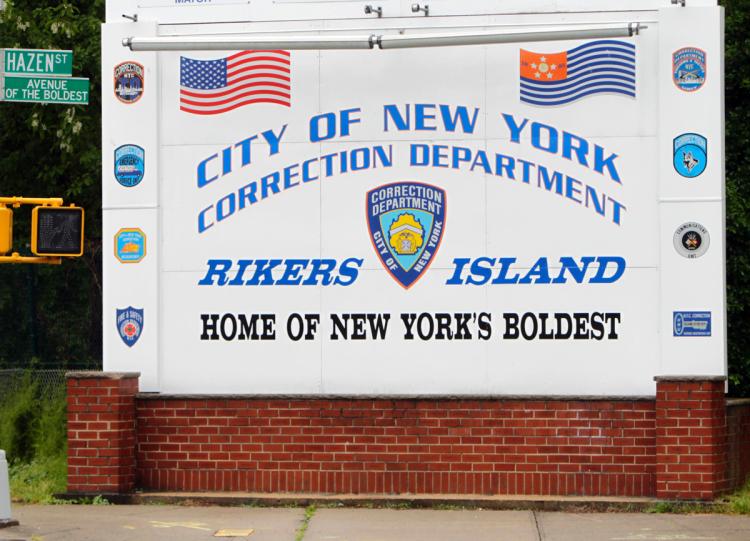What I Learned at New York’s Most Infamous Prison
The following post was written by Caroline Shea, a Campus Coordinator at Manhattan College in New York.
 Have you ever wondered what it was like to spend time in a facility where everyone around you can either take you to the ground within seconds or has committed what the state calls a “crime”?
Have you ever wondered what it was like to spend time in a facility where everyone around you can either take you to the ground within seconds or has committed what the state calls a “crime”?
Riker’s Island, on the East River in New York City, was founded eighty-three years ago in 1935 and it was designed to be a self-sustaining facility where inmates would perform duties that benefited both themselves and New York City. In 1969, the island was at double its capacity at 14,000 people to 8,000 beds and that was a time where suicide, sexual misconduct, assault, and drug trafficking became common. In 2016, members of the New York City Council and Governor Cuomo called for Mayor de Blasio to close all prisons on Riker’s Island. So far, most of the island is still in active use with a couple of the ten facilities slated for closure soon.
Manhattan College is a small private college located in west Bronx where there is a course titled “Religion 399: Criminal Justice Ethics” led by Dr. Andrew Skotnicki who has made it his life mission to reform the criminal justice system. This course takes place entirely on Riker’s Island with eleven students who come from the campus in The Bronx and six students (in class we call them “brothers” or “inside students”) who currently reside within the walls of a Riker’s Island prison.
The objective of the course is to teach the brothers life skills, how to write college level essays, communication skills, and how to analyze philosophical texts. These men all either have their high school diploma or their GED and are all minimum-security offenders. The main drive of this class is not simply to learn skills that may not help them once they leave their temporary residence, but to help them once they attend Manhattan College. The last day of the course encompasses a graduation ceremony where the brothers can invite people from the outside and where they receive their admission letter into Manhattan College with free tuition.
I interviewed some of the brothers who I am taking this course with. With the promise of being left anonymous, they spoke candidly about their feelings regarding this course. One brother stated: “I respect this [the class], but I don’t like it” with another brother who agreed with him but expanded on that by saying “I am not glad to be locked up, but I am glad to take this class. Without the Island I wouldn’t have a future”.
Most of the brothers agreed that “This class kept me out of trouble. It saved me. It saved my [release] date” and that “The whole country should know what happens in this classroom so that it can be done elsewhere”
For the safety of every student we are accompanied by a correctional officer who works with the brothers to help them make a difference in their life. I interviewed the officer who has been a key member of this program for six years and she stated, “I want them to succeed, they need to see that. I believe in them. It’s [this course] very hard for people who lacked respect and care, I teach them that”. This course provides the brothers with structure and much need confidence. It is vital that these men know that there are people who believe in them and that reform is possible.
This program has a strong success rate with the first brother to graduate in May 2019 and other men and women are currently enrolled. This is a prime example of criminal justice reform. This is a program that should be fully backed by the Libertarian Party and Students For Liberty.
This program helps both the students on Riker’s Island and helps society create more people who can facilitate rather than hinder advancement. Through this course, I have realized that mandatory minimums and hyper-incarceration of young low-class minority males is a real issue that is plaguing the criminal justice system. Closing Riker’s Island will not solve that problem because those men and women will have to be placed in other prisons throughout New York rather than being made into beneficial members of society.
The inside brothers are non-violent offenders who have innate human rights and the current criminal justice system is treating these people without humanity. If there was a higher focus on treating people more humanely then the recidivism rate would also decrease. This program helps reduce the recidivism rate, lessens the cost on the average tax-payer (since it is all currently done through grants), and treats the incarcerated population with an increased amount of dignity.
The Libertarian Party is fully behind criminal justice reform, ending the racist War on Drugs, and adding humanity back into the legal system. If this interests you and/or sparks opinions within you than please consider joining the Libertarian Party and if you are a passionate reform-centered student join Students For Liberty. These are issues that should be at the forefront of every American’s mind because change needs to occur, and it is up to the students to make that change happen.
This piece solely expresses the opinion of the author and not necessarily the organization as a whole. Students For Liberty is committed to facilitating a broad dialogue for liberty, representing a variety of opinions. If you’re a student interested in presenting your perspective on this blog, visit our guest submissions page. Like what you read here? You can sign up for a weekly digest of the SFL blog and subscribe for a weekly update on SFL’s events, leadership programs, and resources.
